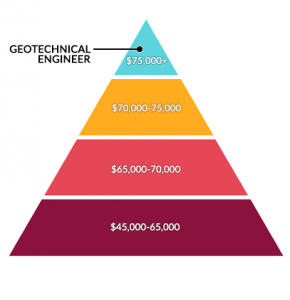The Definitive Guide to Geotheta
Table of ContentsThe smart Trick of Geotheta That Nobody is Talking AboutThe Facts About Geotheta UncoveredThe Geotheta IdeasRumored Buzz on GeothetaHow Geotheta can Save You Time, Stress, and Money.

They carry out website investigations, gather examples, do laboratory tests, and evaluate data to examine the suitability of the ground for building tasks - Geo Tech Engineer. Based upon their searchings for, geotechnical engineers offer suggestions for foundation style, slope stability, keeping structures, and mitigation of geotechnical dangers. They work together with various other specialists, such as designers, structural engineers, and construction teams, to guarantee that geotechnical considerations are integrated into the overall job design and application
By examining the actions and properties of soil and rock, they can determine possible geotechnical threats such as landslides, dirt negotiation, or slope instability. Their experience aids prevent failings or crashes that could jeopardize lives and residential property. Here are some in-depth tasks and obligations of a geotechnical engineer: Site Investigation: Geotechnical engineers conduct website investigations to gather data on subsurface problems.
They translate the data to understand the residential properties and behavior of the dirt and rock, including their strength, permeability, compaction features, and groundwater conditions. Geotechnical Analysis and Style: Geotechnical engineers analyze the data accumulated throughout site examinations to evaluate the stability and suitability of the site for construction tasks. They execute geotechnical computations and modeling to evaluate elements such as birthing capability, negotiation, slope security, side earth pressures, and groundwater flow.
Rumored Buzz on Geotheta
Foundation Design: Geotechnical engineers play an essential duty in making foundations that can securely support the designated framework. They analyze the dirt problems and lots demands to figure out the suitable foundation type, such as shallow structures (e.g., footings), deep foundations (e.g (https://www.pubpub.org/user/ian-hammond)., heaps), or specialized techniques like dirt enhancement. They think about aspects such as negotiation limitations, birthing capability, and soil-structure interaction to create ideal foundation designs
They assess construction strategies, monitor site tasks, and perform field examinations to confirm that the layout recommendations are complied with. If unexpected geotechnical concerns develop, they evaluate the situation and offer referrals for removal or adjustments to the design. Risk Evaluation and Mitigation: Geotechnical engineers analyze geotechnical threats and dangers connected with the job website, such as landslides, liquefaction, or dirt disintegration.

Cooperation and Interaction: Geotechnical engineers work carefully with other experts associated with a job, such as designers, structural designers, and building teams. Efficient interaction and partnership are necessary to integrate geotechnical considerations into the total task design and building process. Geotechnical designers offer technological proficiency, answer inquiries, and make certain that geotechnical demands are met.
Geotheta Fundamentals Explained
Below are some kinds of geotechnical designers: Foundation Designer: Foundation engineers specialize in developing and evaluating foundations for structures. They assess the soil conditions, load needs, and website features to establish one of the most proper foundation type and design, such as superficial foundations, deep structures, or specialized techniques like heap structures.
They examine the aspects affecting incline stability, such as dirt homes, groundwater problems, and slope geometry, and create methods to protect against incline failures and alleviate dangers. Quake Engineer: Quake designers concentrate on examining and creating structures to endure seismic pressures. They assess the seismic hazard of a site, evaluate dirt liquefaction potential, and create seismic style requirements to guarantee the safety and strength of frameworks during quakes.
They carry out area screening, accumulate samples, and evaluate the collected data to identify the soil homes, geologic developments, and groundwater conditions at a site. Geotechnical Instrumentation Designer: Geotechnical instrumentation engineers focus on monitoring and measuring the habits of soil, rock, and structures. They set up and preserve instrumentation systems that monitor variables such as soil settlement, groundwater degrees, incline movements, and structural variations to examine performance and offer early cautions of prospective issues.
The Single Strategy To Use For Geotheta
They perform examinations such as triaxial examinations, combination tests, straight shear examinations, and leaks in the structure tests to collect information for geotechnical evaluation and layout. Geosynthetics Engineer: Geosynthetics engineers concentrate on the layout and application of geosynthetic materials, such as geotextiles, geogrids, and geomembranes. They use these products to improve soil security, reinforce slopes, give drain remedies, and control erosion.
They often tend to be investigative people, which means they're intellectual, introspective, and curious. They wonder, methodical, logical, logical, and sensible. Some of them are additionally social, suggesting they're kind, charitable, cooperative, individual, caring, handy, empathetic, skillful, and friendly. Does this noise like you? Take our cost-free career test to figure out if geotechnical engineer is one of your leading occupation suits.
In the office atmosphere, geotechnical engineers use specialized software tools to do calculations, create layouts, and analyze data. They prepare reports, review job requirements, connect with clients and staff member, and coordinate job tasks. The workplace setup gives a conducive environment for study, evaluation, and collaboration with other professionals associated with the task.
The Ultimate Guide To Geotheta
They frequently see project reference websites to carry out site investigations, assess geotechnical problems, and gather data for analysis. These sees involve traveling to various areas, sometimes in remote or tough terrains. Geotechnical engineers may execute soil sampling, conduct examinations, and display building activities to make certain that the geotechnical elements of the project are being carried out correctly.
Geotechnical engineers additionally work in specialized geotechnical laboratories. In these centers, they carry out experiments, carry out tests on dirt and rock examples, and examine the design homes of the products. Geotechnical lab engineers function thoroughly in these environments, managing screening tools, operating tools, and videotaping information. They team up with other research laboratory team to ensure exact and reliable testing results.